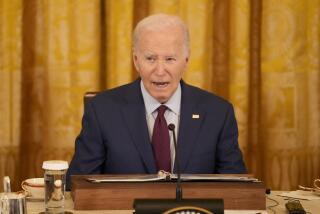Cancel Iraqi Debt? What About Africa?
- Share via
JOHANNESBURG, South Africa — The almost instant success that James A. Baker III has had in his international lobbying to have Iraq’s debt forgiven raises an uncomfortable comparison: how little has been done to relieve the African debt that cripples some of the world’s poorest countries.
Since the mid-1990s, advocacy groups have been pushing for the cancellation of the debt that has left African countries starved of funds to fight AIDS, address poverty and improve education and health systems.
Yet it took Baker, a former head of the State Department and the Treasury, just weeks as President Bush’s special envoy to win promises of debt reduction for oil-rich Iraq.
“It’s a huge contradiction,” said Neville Gabriel of the Southern African Catholic Bishops’ Conference, a leading force in the Jubilee debt-relief movement.
The amount of debt forgiveness the United States is seeking for Iraq has not been announced, but reports suggest the target would be two-thirds of its $116-billion obligation.
Baker succeeded in persuading many of the countries that opposed the war in Iraq, such as France, Germany, Russia and China, to offer what was termed “substantial” relief. In this scenario, those countries and Japan would cut Iraq’s debt and restructure remaining payments so that the country could spend future oil revenue on reconstruction, not debt service.
A major difference between Iraq’s $116-billion debt and Africa’s aggregate $300-billion debt is the creditors. Iraq’s is owed mainly to various countries. Africa’s main lenders are the International Monetary Fund and the World Bank, which have strongly resisted public pressure for debt cancellation, arguing that it would compromise their ability to lend to poor countries in the future and collect on debts. The United States is the biggest shareholder in both institutions.
Activists charge that the contrast between progress on Iraqi debt and the paralysis of debt-relief programs for Africa reflects the low priority Western nations often accord Africa.
“When we started the global Jubilee movement in 1996, the analysis was that debt cancellation happens largely for political reasons,” Gabriel said. “That was one of the things we wanted to challenge. We should not have debt cancellation for political interests or out of shallow charity. We were saying this is a question of justice, not charity.”
Last year, Bush traveled to five African nations touting his global anti-AIDS initiative -- a five-year, $15-billion plan to help 14 of the hardest-hit nations in Africa and the Caribbean. Yet critics complained that the aid program fell far short.
Some groups that push for African debt cancellation worry that once the world’s economic powers have cut Iraq’s debt, Africa will be left on the back burner. Others are more optimistic. Salih Booker of the U.S. lobbying group Africa Action said it will strengthen Africa supporters because the U.S. would not want to look hypocritical.
“I think the prospects are good to achieve some greater initiatives [on African debt] because it’s becoming clearer that this is unsustainable debt. And also there is a political question: Is the U.S. practicing a double standard against the poorest countries in the world?”
Russia has indirectly linked Iraqi debt relief with access to reconstruction or oil contracts. Many debt-relief activists see that as a prime reason for the generous promises of creditors.
“In the case of Iraq, the U.S. is exerting its influence and pressure that these countries swallow the cost and cancel the debt,” Booker said. “But the U.S. has failed or refused to use its significant influence in the World Bank and IMF to reduce African debt.”
African countries had to rely on the IMF and World Bank because of other lenders’ reluctance to risk funds.
“That doesn’t change the fact that it’s odious debt and the institutions ... made loans knowingly to regimes that were kleptocracies, such as to Mobutu in Zaire,” said Booker, referring to the late Mobutu Sese Seko, who seized power in 1965. Now called the Democratic Republic of Congo, the nation is carrying debts of $16 billion.
“It’s clear that the Congolese people should not have to use their scarce resources to pay back this interest,” Booker said.
Interest payments often trap countries in a debt cycle, with some repaying the original borrowings twice over yet still facing steep debt servicing costs.
Some analysts, such as prominent economist Jeffrey Sachs of Columbia University, have called on African countries to unilaterally redirect all debt servicing to the fight against acquired immune deficiency syndrome. In September 2000, U.N. Secretary-General Kofi Annan called for a moratorium on African countries’ debt payments and for an independent group to define which debts were legitimate and which were not.
But there was resistance from industrialized countries. In 1996, facing global pressure, the World Bank and IMF created a debt-relief program called the Heavily Indebted Poor Countries Initiative. It assessed what poor, primarily African, countries could pay and offered reductions to those who followed the institutions’ directives. But assumptions about the countries’ future export earnings, on which debt relief calculations were based, were wildly optimistic.
The initiative was expanded in 1998, and by 2003 more than $36 billion in debt had been written off, but that was less than a third of the $110 billion promised for the world’s 53 poorest countries. Meanwhile, aid to those countries fell sharply. Jubilee research suggested that aid flows fell from $6.26 billion in 1998 to $4.36 billion in 2000.
Albert Mwenda, program officer with the Nairobi, Kenya-based Institute of Economic Affairs, said canceling Iraq’s debt would be unlikely to assist Africa’s cause.
“If you look at the figures, not only the amount of money they’re writing off but also the amount of money the U.S. is putting into Iraq, it means there will be less and less for Africa.”
More to Read
Sign up for Essential California
The most important California stories and recommendations in your inbox every morning.
You may occasionally receive promotional content from the Los Angeles Times.










